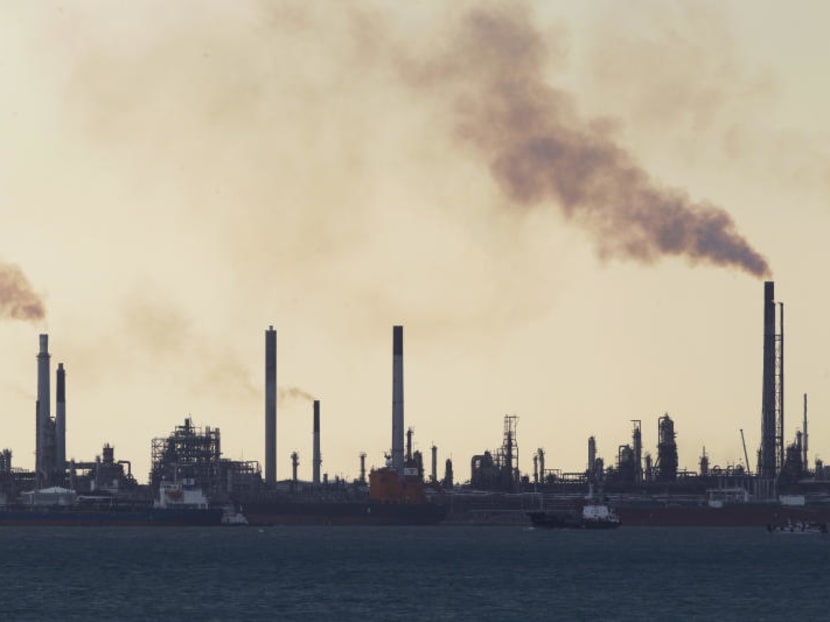PAP’s youth wing recommends increasing carbon tax, tracking emissions of large emitters to tackle climate change
SINGAPORE — Raise the carbon tax to 20 times its current rate of S$5 for each tonne of greenhouse gases and track the carbon emissions of all companies with a net revenue above S$10 million.

The paper calls for the Government to track the carbon emissions of all companies with a net revenue above S$10 million.
SINGAPORE — Raise the carbon tax to 20 times its current rate of S$5 for each tonne of greenhouse gases and track the carbon emissions of all companies with a net revenue above S$10 million.
These are some of the suggestions put forth by the youth wing of the People’s Action Party (PAP) in its position paper to tackle climate change here.
Called “Singapore: A Green Hub”, the 20-page paper contains recommendations to mitigate the effects of climate change in Singapore.
In a press release on Thursday (March 5), the Young PAP (YP) said that the paper was put together following two focus group discussions over three months. These discussions involved 16 representatives of climate change groups and YP activists.
The representatives included those from Singapore Youth for Climate Action, a youth advocacy group for climate action, and Fossil-Free Yale-NUS, a group founded in 2017 by students from Yale-NUS College. Several independent sustainability experts and climate activists were also consulted.
The following are some the paper’s recommendations:
#1 Raising carbon tax to 20 times its current rate
Recommendation: The paper calls for the carbon tax rate to be raised to S$100 per tonne of greenhouse gases, up from the current S$5 per tonne.
The tax, which came into effect last year, is capped at its current rate until 2023, following which the price will be reviewed and increased to between S$10 and S$15 per tonne.
The tax applies to industrial facilities that emit 25,000 tonnes or more of greenhouse gases annually
In addition, the paper also calls for the adoption of a hybrid cap-and-trade model along with the carbon tax model in the long-term.
The cap-and-trade model involves setting a cap on the total amount of greenhouse gases that can be emitted. Within the cap, companies can receive or buy emission allowances, which they can use or trade with other companies.
The reason: The paper said that academics had suggested that carbon taxing is ineffective in Singapore because Singaporeans enjoy a relatively high income and can pay the tax off easily.
“Carbon taxation thus does not guarantee the desired level of emissions reduction. Conversely, it may even increase the potential for monopolistic firms to pass on the entire tax to consumers,” said the paper.
On the other hand, the cap-and-trade model will promote greater certainty around emissions reduction and help the Government achieve predetermined emissions targets, said the paper.
What others have said: The issue of raising the carbon tax is a recurring one which had come up again during the Ministry of the Environment and Water Resources’ (MEWR) Committee of Supply debate in Parliament on Wednesday. Member of Parliament for Nee Soon Group Representation Constituency Louis Ng, for instance, had called the current rate “too low”, and the timeline for review as “too long”.
However, in his response, Mr Masagos Zulkifli, Minister for the Environment and Water Resources, said that the carbon tax is meant to provide an economy-wide price signal.
#2 Increasing public access to data on emissions
Recommendation: The paper calls for the Government to track the carbon emissions of all companies with a net revenue above S$10 million.
It also calls for more data on carbon emissions to be made available to civil society. This includes data on carbon emissions sorted by industry, and the methodologies used for calculating emissions.
The reason: In its paper, YP said that the greenhouse gas emissions of industries such as the tourism, aviation and maritime sectors are generally excluded from data reporting, leading to “blind spots” in efforts to reduce emissions. As such, tracking large emitters will help with policy-making.
In addition, the YP said that releasing data on emissions to the public will allow civil society to work with the Government to come up with solutions to tackling climate change, and can also be used to educate the public on climate change.
What others have said: During the debate on MEWR’s budget on Wednesday, Non-Constituency Member of Parliament Dennis Tan of the Workers’ Party had asked if the Government could provide aggregated information to the public on the improvements made by large emitters to reduce their emissions. MP for Nee Soon GRC Mr Ng also argued that disclosing the emissions data of big emitters will pressure them to cut emissions.
In his response, Mr Masagos said that rather than scrutinising individual companies to achieve emissions reductions, it is more useful to know which sectors the Government should concentrate on. He said that the release of individual data could also be commercially sensitive.
#3 Quantifying growth through holistic metrics
Recommendation: The paper calls for the Government to quantify growth through different forms of holistic metrics such as the Human Development Index or the United Nations Environment Inclusive Wealth Index.
The Human Development Index includes criteria such as health, education and standard of living to assess the development of a country, rather than economic growth alone.
Likewise, the United Nations Environment Inclusive Wealth Index includes criteria to measure the sustainability of a country to track its progress.
The reason: The YP said that the recommendation will help to steer away from perceived overemphasis on economic metrics as a means to calculate growth.
Going forward, the YP said that it will conduct engagements with various industrial and non-profit organisations this month to get their views on Singapore’s existing efforts on climate change.








